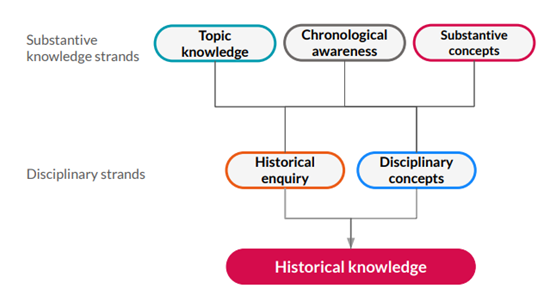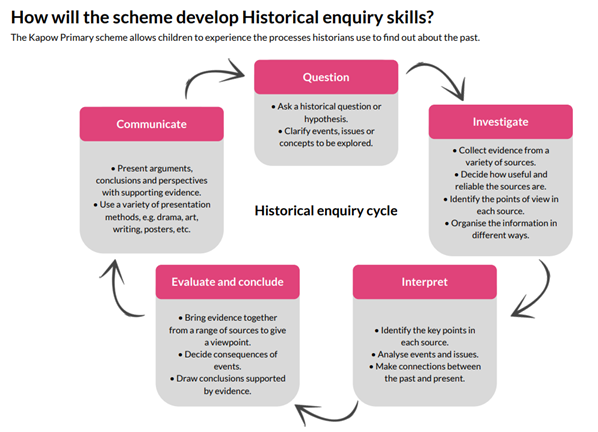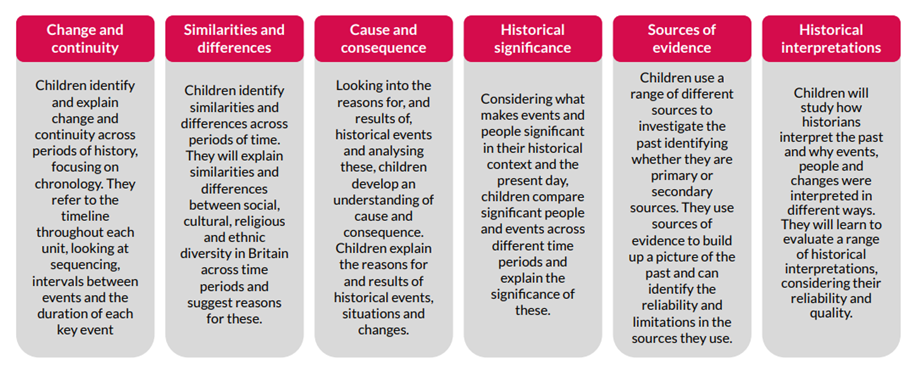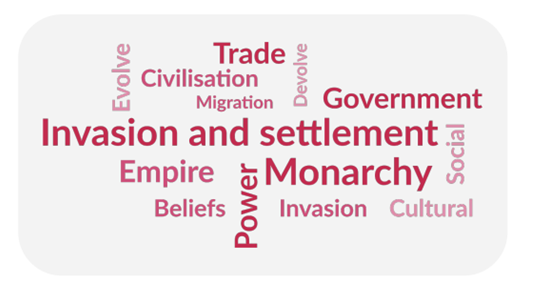Intent:
Hardwick Green’s History scheme of work is based on Kapow primary’s history curriculum. It aims to inspire pupils to be curious and creative thinkers who develop a complex knowledge of local and national history and the history of the wider world. We want pupils to develop the confidence to think critically, ask questions, and be able to explain and analyse historical evidence.
Through our scheme of work, we aim to build an awareness of significant events and individuals in global, British and local history and recognise how things have changed over time. History will support children to appreciate the complexity of people’s lives, the diversity of societies and the relationships between different groups. Studying History allows children to appreciate the many reasons why people may behave in the way they do, supporting children to develop empathy for others while providing an opportunity to learn from mankind’s past mistakes. The curriculum aims to support pupils in building their understanding of chronology in each year group, making connections over periods of time and developing a chronologically-secure knowledge of History.
We hope to develop pupils’ understanding of how historians study the past and construct accounts and the skills to carry out their own historical enquiries.
In order to prepare pupils for their future learning in History, our scheme aims to introduce them to key substantive concepts including power, invasion, settlement and migration, empire, civilisation, religion, trade, achievements of humankind, society and culture.
The History scheme of work enables pupils to meet the end of Key stage attainment targets in the National curriculum and the aims also align with those set out in the National curriculum.
Implementation:
In order to meet the aims of the National curriculum for History and in response to the Ofsted Research review into History, we have identified the following key strands:

The curriculum scheme emphasises the importance of historical knowledge being shaped by disciplinary approaches, as shown in the diagram above. These strands are interwoven through all our History units to create engaging and enriching learning experiences which allow the children to investigate history as historians do. Each six-lesson unit has a focus on chronology to allow children to explore the place in time of the period they are studying and make comparisons in other parts of the world. Children will develop their awareness of the past in Key stage 1 and will know where people and events fit chronologically. This will support children in building a ‘mental timeline’ they can refer to throughout their learning in Key stage 2 and identifying connections, contrasts and trends over time. The online Kapow Primary timeline supports children in developing this chronological awareness. Units are organised around an enquiry-based question and children are encouraged to follow the enquiry cycle (Question, Investigate, Interpret, Evaluate and conclude, Communicate) when answering historical questions.

Over the course of the scheme, children develop their understanding of the following key disciplinary concepts:
- Change and continuity.
- Cause and consequence.
- Similarities and differences.
- Historical significance.
- Historical interpretations.
- Sources of evidence.
These concepts will be encountered in different contexts during the study of local, British and world history. Accordingly, children will have varied opportunities to learn how historians use these skills to analyse the past and make judgements. They will confidently develop and use their own historical skill set. As children progress through the curriculum, they will create their own historical enquiries to study using sources and the skills they have developed.

Substantive concepts such as power, trade, invasion and settlement, are introduced in Key stage 1, clearly identified in Lower key stage 2 and revisited in Upper key stage 2 (see Progression of skills and knowledge) allowing knowledge of these key concepts to grow. These concepts are returned to in different contexts, meaning that pupils begin to develop an understanding of these abstract themes which are crucial to their future learning in History.

The curriculum follows the spiral model where previous skills and knowledge are returned to and built upon. For example, children progress by developing their knowledge and understanding of substantive and disciplinary concepts by experiencing them in a range of historical contexts and periods.

We use History in Action videos explain the careers and work of those in history and heritage-related fields. Historians, archivists, archaeologists, museum curators, teachers and heritage experts discuss their love of history, how they became interested in the subject, how they got into their jobs and what their jobs involve.
Lessons are designed to be varied, engaging and hands-on, allowing children to experience the different aspects of an historical enquiry. In each lesson, children will participate in activities involving disciplinary and substantive concepts, developing their knowledge and understanding of Britain’s role in the past and that of the wider world. Children will develop their knowledge of concepts and chronology as well as their in-depth knowledge of the context being studied.
The scheme of work provides ideas for scaffolding for every lesson to ensure that the high expectations of the curriculum can be accessed by all pupils. Opportunities to stretch pupils’ learning are also detailed when required. Knowledge organisers for each unit support pupils in building a foundation of factual knowledge by encouraging recall of key facts, concepts and vocabulary.
Impact:
Pupils should leave our school equipped with a range of skills to enable them to succeed in their secondary education. They will be enquiring learners who ask questions and can make suggestions about where to find the evidence to answer the question. They will be critical and analytical thinkers who are able to make informed and balanced judgements based on their knowledge of the past.
The expected impact of following our history curriculum is that children will:
- Know and understand the history of Britain, how people’s lives have shaped this nation and how Britain has influenced and been influenced by the wider world.
- Develop an understanding of the history of the wider world, including ancient civilisations, empires, non-European societies and the achievements of mankind.
- Develop a historically-grounded understanding of substantive concepts - power, invasion, settlement and migration, civilisation, religion, trade, achievements of mankind and society.
- Form historical arguments based on cause and effect, consequence, continuity and change, similarity and differences.
- Have an appreciation for significant individuals, inventions and events that impact our world both in history and from the present day.
- Understand how historians learn about the past and construct accounts.
- Ask historically-valid questions through an enquiry-based approach to learning to create structured accounts.
- Explain how and why interpretations of the past have been constructed using evidence.
- Make connections between historical concepts and timescales.
- Meet the end of key stage expectations outlined in the National curriculum for History.
The impact of our History curriculum is constantly monitored through both formative and summative assessment opportunities. We use Enquire Learning Trust’s foundation subject assessment system, which shows pupils’ understanding in both substantive and disciplinary knowledge, and identifies next steps for learning and areas to be the focus of retrieval practice to ensure pupils know more and remember more in history.